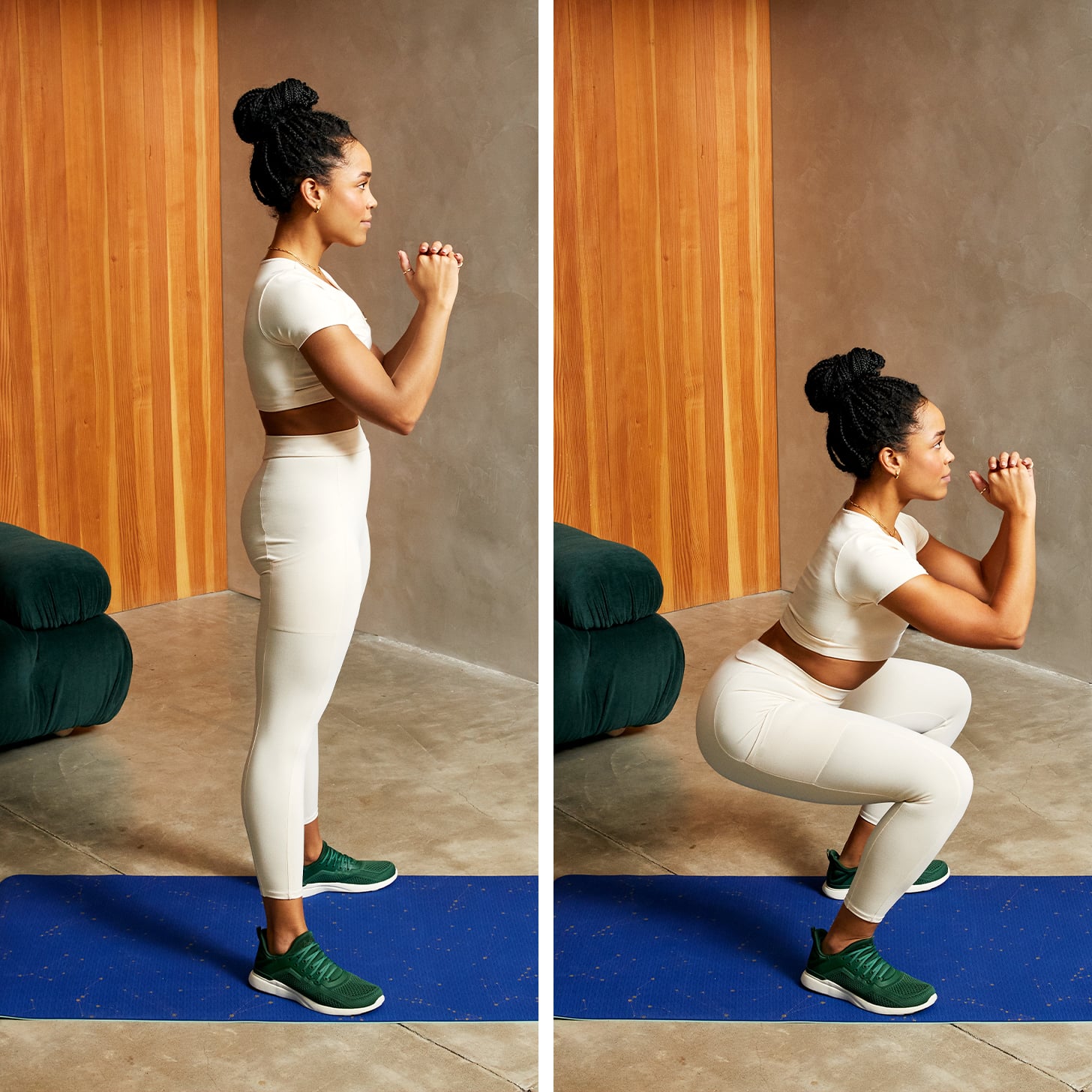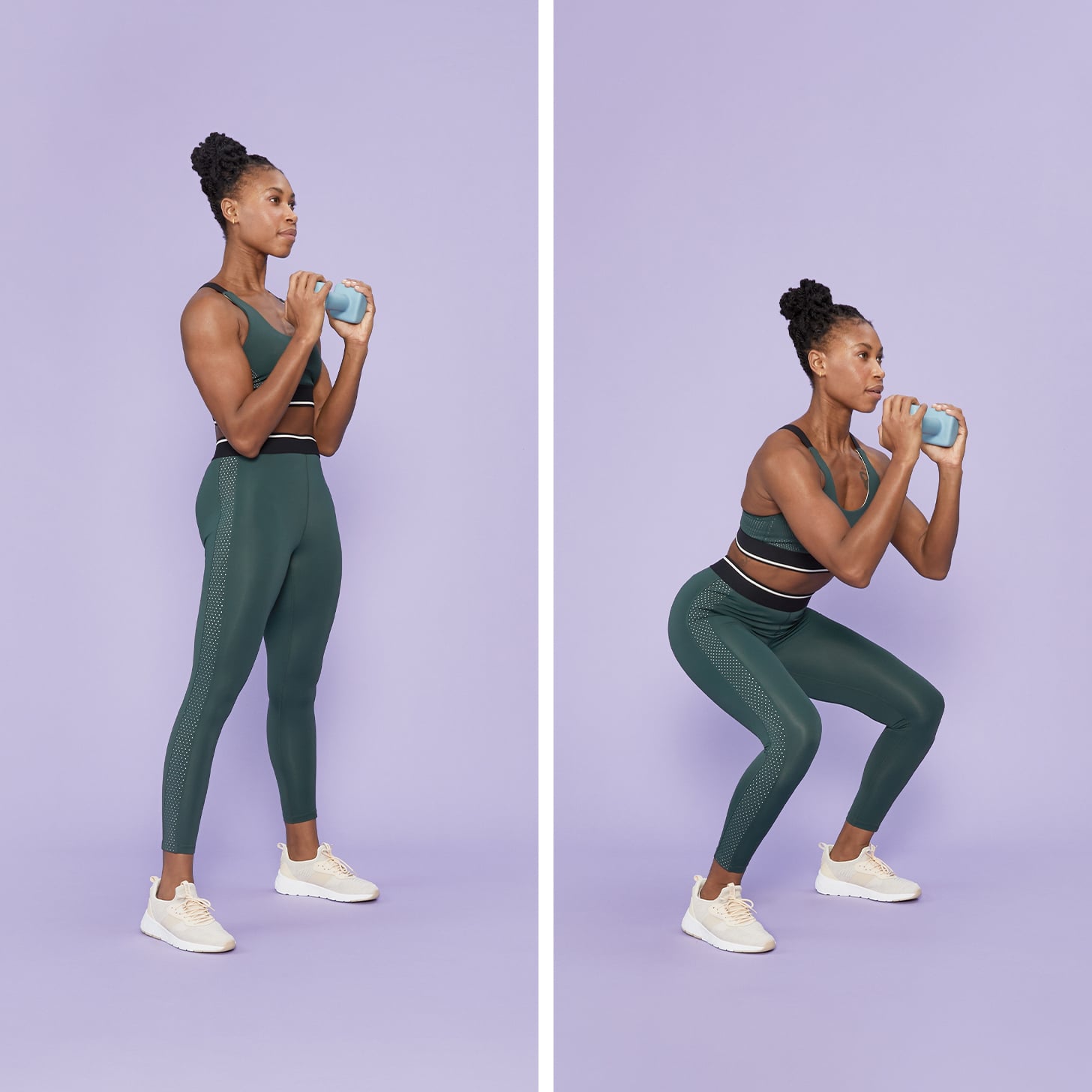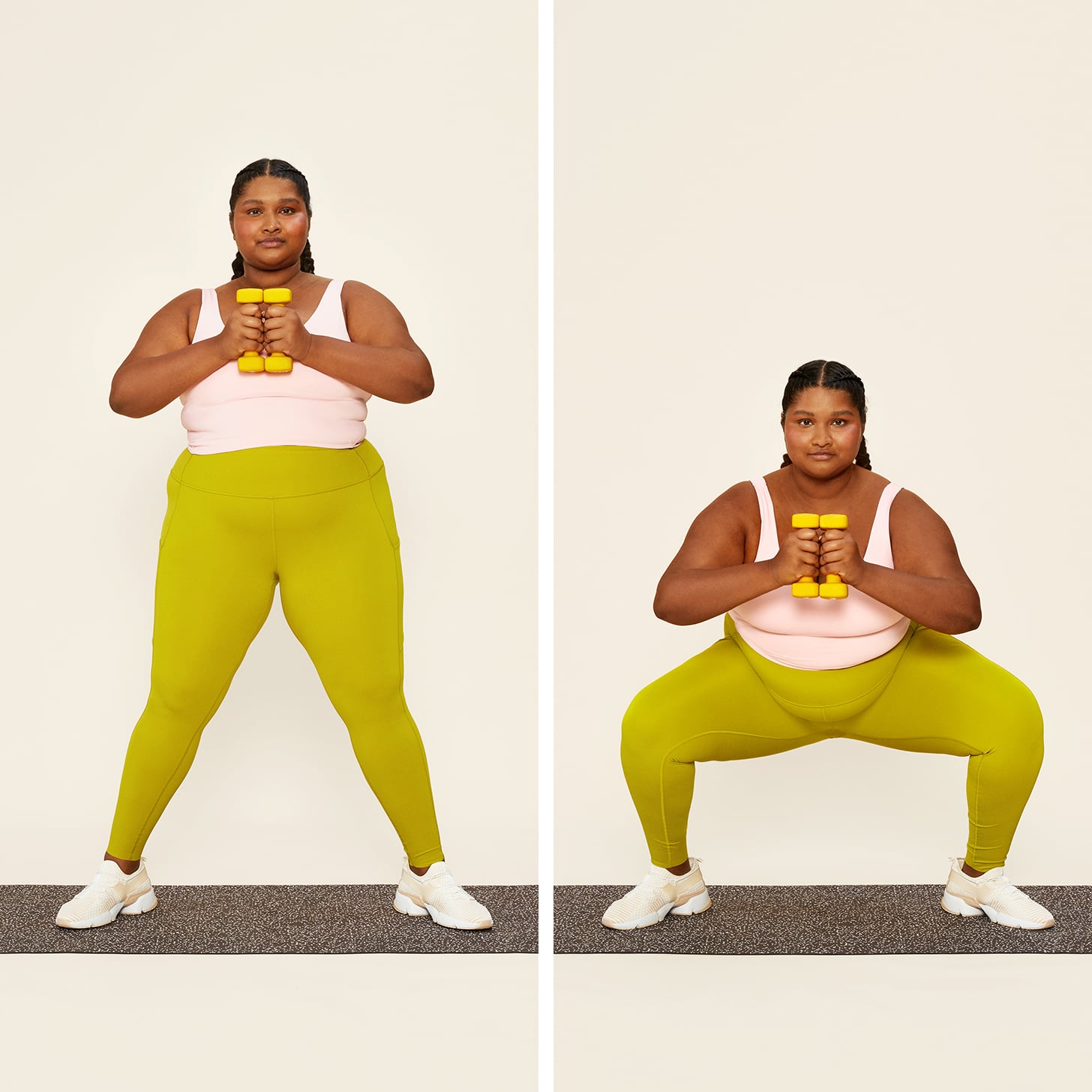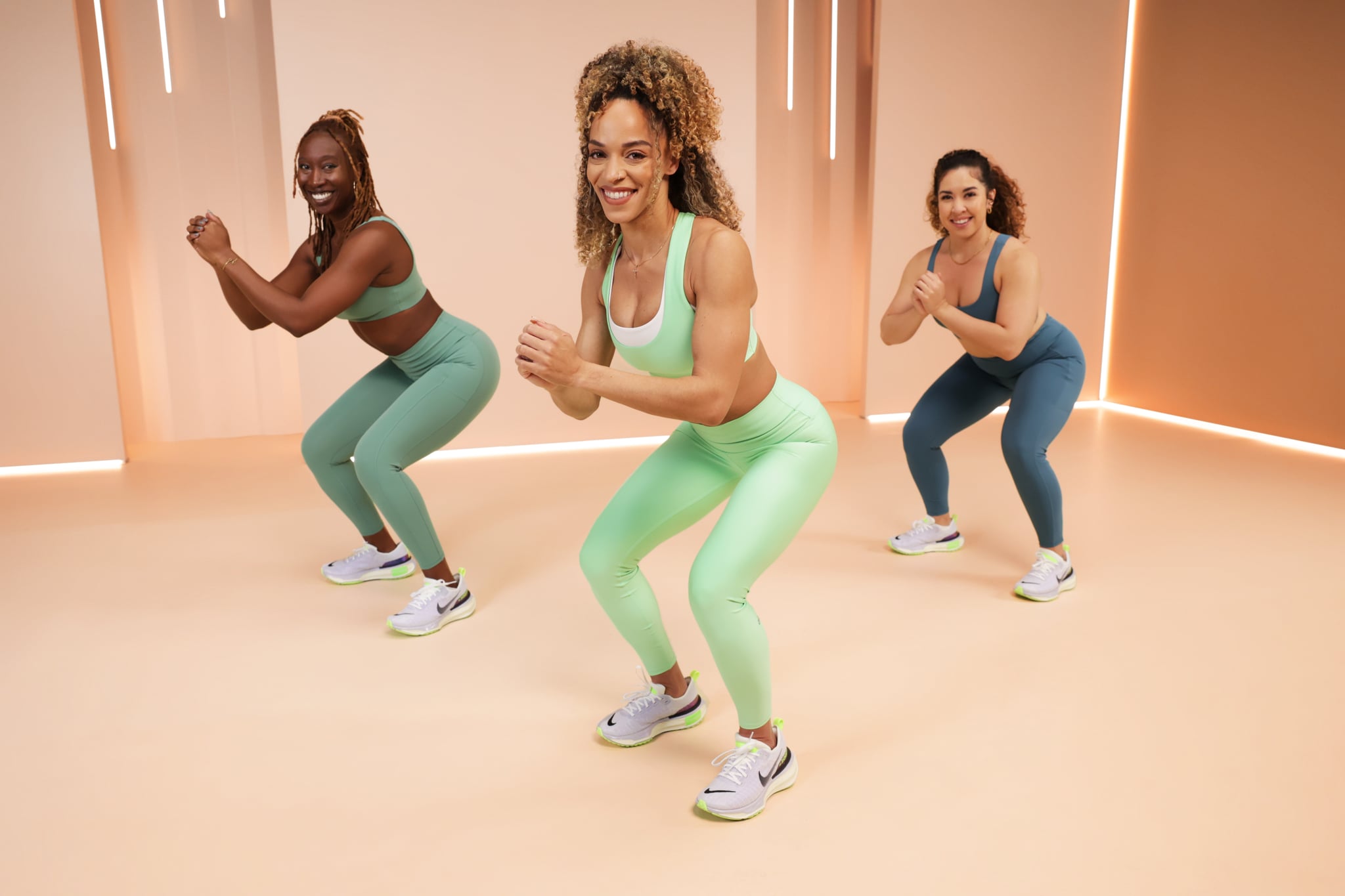Squats are one of the most effective exercises you can do to strengthen your lower body. As a compound exercise that works several large and powerful muscle groups, squats are a fantastic exercise for getting your heart rate up, building strength, and even improving your mobility. It’s also a fundamental human movement pattern that you probably do every single day without even realizing it (think: sitting on the toilet or getting out of bed).
But just because squats are simple doesn’t mean they’re easy to perfect — in fact, there are tons of ways to do them wrong. It’s important that you know how to do squats with proper form to prevent injury during your workouts and day-to-day life, and also to maximize your fitness routine’s effectiveness.
Not sure if you’re doing squats with proper form, or which muscles they’re supposed to work, anyway? Here’s everything you need to know about squats, from which muscles squats work and the benefits of squats to how to do basic bodyweight squats and how to make them harder by doing different types of squat variations.
Once you’ve mastered the basics, the possibilities are endless. We love that you can do bodyweight squats anywhere, and that you can always make squats harder — either by adding dumbbells or other weights, or doing variations that also work multiple body parts like squats with bicep curls. If you’re new to strength training, bodyweight squat variations are perfect for beginners. As you get more comfortable with squats, do the variations listed below to get even stronger.
What Muscles Do Squats Work?
Whether you do bodyweight squats or squats with dumbbells, kettlebells, or a barbell, this lower-body exercise targets some major muscle groups. Specifically, squats work your quadriceps (front of the thigh) and glutes (butt) the most, followed by your hamstrings (back of the thigh), erector spinae (the muscles along your spine), inner thighs, and calves, according to the National Academy of Sports Medicine (NASM).
You’ll also strengthen several muscles in your core, including the transverse abdominis (your deep abdominal muscles), which works to keep your torso upright and stable.
Benefits of Squats
The key benefit of squats is that they improve lower-body strength, endurance, and power, according to NASM, which will help you in all fitness activities such as walking, running, cycling, dancing, hiking, skiing — just about everything.
Research confirms that the squat movement pattern is “one of the most primal and critical fundamental movements necessary” for improving athletic performance, reducing injury risk, and supporting lifelong physical activity. It can improve performance skills like sprint speed or jump height, as well as be used to improve balance or reduce muscle loss in older adults, according to the International Sports Science Association (ISSA). Doing squats regularly will make it easier (and safer) when you need to squat down to pick something off the floor or lift up your kid, for example, in day-to-day life.

Tips for Proper Squat Form
As fundamental as the squat is, there’s been a lot of debate about exactly how to do the move correctly. You’ve probably seen TikTokers on #GymTok arguing about whether or not to use a weight belt, elevating their toes or heels, and how low you need to go before it’s considered a “real” rep. The good news is that, for the average exerciser, you probably don’t need to worry much about any of those things.
To make sure you’re squatting with proper form, focus on the following:
- Stand in bare feet on a hard floor, and take a video of your squat from the side. One indicator of good form is that your torso stays about parallel to your shins as you lower down into your squat (i.e. the eccentric movement), according to NASM.
- Your back shouldn’t excessively arch or round during any part of your squat, and your feet shouldn’t roll to either side.
- Try not to let your knees knock in or out; if they do, you may need to work on strengthening some of the smaller muscles around your hips.
- How low should you go? According to NASM, researchers have concluded that you don’t reap any extra quad-strengthening benefits from going past the point where your thighs are parallel to the floor. Instead, the organization recommends only lowering as far as you can go with good form, and stopping at parallel. If you’re an advanced exerciser or training for a sport like Olympic weightlifting, then it may be suitable for you to go past that point.
If you’re having trouble with any of these above — or experiencing pain while squatting — it’s a good idea to tap a certified exercise or medical professional for help, according to the ISSA.
How to Do a Bodyweight Squat or Air Squat
Here’s a primer on how to do a bodyweight squat, also known as an air squat, with proper form.
- Stand with your feet shoulder-width apart or just a little bit wider, with your toes very slightly turned out. Clasp your hands at chest level.
- Engage your core and bend at your knees and hips, sticking your butt backward like you’re sitting in an imaginary chair. Keep your chest lifted and your spine neutral, trying not to round or arch your spine. Try to keep your weight spread throughout your whole foot, and thinking about grounding all 10 toes into the floor.
- Pause when your thighs are parallel to the floor, or as low as you can go with good form.
- Push into your feet and squeeze your glutes to straighten your legs and hips and return to standing. That’s one rep.
Start with three sets of 10 squats, then add more reps (12, 15, 20) as you get used to the motion. Focus on your form, then worry about progressing.

How to Do Squats With Weights
To add intensity to your squats, follow the instructions for how to do a squat above, but add weights. Here are a few ways to do so (in order of increasing difficulty), whether you have dumbbells, a kettlebell, a barbell, or something else on hand.
- Dumbbell Goblet Squat: Hold a single dumbbell with both hands horizontally at your chest (shown above).
- Kettlebell Goblet Squat: Hold a kettlebell with both hands at your chest.
- Shoulder-Racked Dumbbell Squat: Hold a dumbbell in each hand just above your shoulders.
- Suitcase Squat: Hold dumbbells or kettlebells by your sides.
- Barbell Back Squat: Hold a barbell across your back, on top of your shoulders.
- Overhead Squat: Hold dumbbells, kettlebells, a barbell, a medicine ball, or a weight plate above your head.

Squat Variations
After mastering the basic squat, try some of these squat variations.
- Jump squat: Do a basic bodyweight squat, but instead of standing up, explode through your feet to jump off the ground, landing softly.
- Sumo Squat: Start with your feet wider than shoulder-width, and toes turned out (shown above).
- Single-Leg Squat: Balance on one leg, and sit back to lower into a squat on your standing leg.
- Squat With Side Kick: Do a bodyweight squat, then stand and extend one leg out to the side to engage your glutes.
- Squat to Press: Do a dumbbell squat, then stand and press the dumbbells overhead to engage your shoulder muscles.
Workouts With Squats
Here are a few workouts you can try that include bodyweight and weighted squats:
— Additional reporting by Jenny Sugar
Image Source: POPSUGAR Photography / Liz Ehlers; Sam Kang
Product Credit: POPSUGAR TPE Yoga Mat, Live the Process crop top, Live the Process leggings, APL sneakers, Kris Nations gold necklace, Emma Pills ring, Senia Rachel links; POPSUGAR 8lb dumbbells, Splits59 sports bra, Splits59 Leggings, Avre snreakers; POPSUGAR 3lb, 8lb dumbbells, Halara sports bra, Lululemon leggings, Avre sneakers
